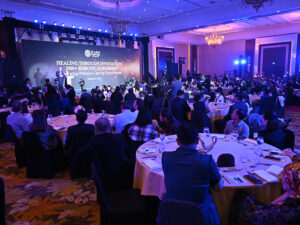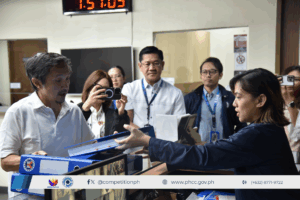Every September, we look forward to sharing the results of our firm’s Philippine CEO Survey, timed to coincide with the International CEO Conference of the Management Association of the Philippines (MAP).
Now on its 11th year, our survey continues to provide valuable insights into the perspectives of business leaders across the country. This year, 175 CEOs participated, with 67% representing large companies.
Despite headwinds — such as the recent downgrading of the Philippines’ 2025 GDP growth forecast from 6.1% to 5.5% as well as growing concerns about rising commodity prices, it’s encouraging to see that most CEOs remain optimistic about their industries in the coming year. In fact, many expect their companies to achieve revenue growth over the next three years — a hopeful sign for the future.
Beginning last year, we also asked CEOs what keeps them awake at night. Just like the previous year, our CEOs continue to cite geopolitical uncertainty, uncertain economic growth, and workforce issues as their top concerns. Why do these challenges still weigh heavily on their minds despite their overall optimism? More importantly, what can they do to manage these risks?
GEOPOLITICAL UNCERTAINTYGeopolitical uncertainty remains a major concern for CEOs. The ongoing conflicts between Ukraine and Russia and between Israel and Hamas show no clear signs of ending, and their impact is felt worldwide — from rising fuel prices to disrupted supply chains, inflation, and shaken investor confidence. On top of that, uncertainties around US tariffs are disrupting the business landscape. These factors have led to lost customers, postponed expansion plans, and higher costs for businesses.
Many CEOs see diversification as the obvious solution. In fact, 35% of the CEOs plan to enter a new industry, making this the top strategic move for recovery and growth. Additionally, 28% plan to expand into new markets outside the Philippines.
With stronger workforce skills and improved digital infrastructure, companies are in position to expand into new markets. But it’s not just about entering new markets or launching new products — a smart strategy is critical. That means making sure the market is ready, finding the right partners, setting up the right structures, and complying with local laws and regulations. With careful planning, businesses can turn these challenges into opportunities.
UNCERTAIN ECONOMIC GROWTHUncertain economic growth continues to be a top concern for our CEOs, with about 42% expecting global growth to slow down over the next year. The International Monetary Fund forecasts the global economy to grow by just 3.0% this year, down from 3.3% last year. Several factors are at play here, including uncertainties around US tariffs, rising fiscal deficits, ongoing political tensions, and possible disruptions to global supply chains.
Our CEOs recognize that a slower economy impacts customer spending patterns and leads to higher costs, as we’ve seen recently. As such, being prepared is more important than ever. That means business leaders need to engage in thorough scenario planning — looking at different possibilities, even including a recession, and assessing how each might affect company profits, cash flow, and growth.
Additionally, stress-testing the balance sheet is essential. Companies must ensure they have enough liquidity and reserves to weather any storm. As we saw during the pandemic, companies with enough cash on hand are in a much better position to ride out tough times. Staying proactive and anticipating changes is key to keeping pace with the economy and evolving customer needs.
WORKFORCE ISSUESWorkforce issues also continue to worry Philippine CEOs, with 42% citing it as one of their biggest challenges this year—up from 38% last year. Keeping talented employees remains tough. According to WTW data, voluntary turnover sits at 12.5%, showing that many workers are opting to leave their employers to pursue new opportunities.
Managing people today isn’t easy. Millennials and Gen Z make up about 70% of the workforce, and they’re looking for more than just job security. What really matters to them is company culture, flexibility, strong leadership, and opportunities to grow. On top of that, with rapid advances in AI and automation, some employees are feeling change fatigue; they’re struggling to keep up with how fast everything is evolving.
Thus, CEOs can no longer focus solely on compensation and benefits. It’s equally important to help employees handle change and stress. Prioritizing employee well-being should be a key part of leadership. CEOs must also clearly communicate their vision for the company’s future and how employees fit into that picture.
Support like upskilling programs is essential to help employees close skills gaps and feel confident about the future. Showing that you’re invested in your people’s growth isn’t just good practice — it’s a business imperative.
THE BUSINESS MODEL REINVENTION IMPERATIVEWith everything happening around the world — from rapid technological change to shifting workforce priorities — the pressure on businesses to stay relevant has never been stronger. Our CEOs are feeling it too: more than half now say their organizations won’t be economically viable after 10 years if they continue on their current course, up from 46% last year.
Megatrends like climate change, technological disruption, demographic shifts, global tensions, and social instability are pushing business leaders to act fast. The pressure to reinvent isn’t going away anytime soon. Today’s leaders must do more than adapt to stay several steps ahead – they must anticipate change, drive transformation, and shape the future of their businesses.
The views or opinions expressed in this article are solely those of the author and do not necessarily represent those of Isla Lipana & Co. The content is for general information purposes only and should not be used as a substitute for specific advice.
Trissy Rogacion is a deals and corporate finance partner at Isla Lipana & Co., a Philippine member firm of the PwC network.






